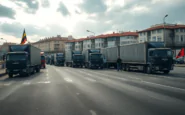Topics Covered
Bosnian truck drivers staged a massive protest that spanned several cities across the country, blocking traffic and paralyzing freight transport. This act of civil disobedience was organized by the Logistika association, which represents over 45.000 transport workers from approximately 600 companies. The demonstrations echoed in strategic locations, such as the capital Sarajevo, and along the borders with Croatia and Serbia.
What are the reasons for the protest?
This mobilization stems from growing discontent among transport workers, who are clamoring for a reduction in the bureaucratic burdens that weigh on their businesses. But what is really happening? Protesters argue that high costs and bureaucratic complications are jeopardizing not only their own business sustainability, but also that of the entire transport sector in Bosnia.
In particular, Logistika representatives point to a European Union law that penalizes Bosnian transporters, forcing them to comply with strict limits on their stay in the EU. According to this regulation, drivers can operate for a maximum of 180 days per year in the EU, of which no more than 90 can be consecutive. This restriction is perceived as a further obstacle for a sector already strained by the current economic conditions. The question is: how can workers maintain their jobs under these circumstances?
What is the impact on traffic?
Roads in Bosnia's main cities were blocked, creating significant disruption not only to traffic but also to businesses. Truckers erected barricades and demonstrated peacefully, yet determinedly, to make their demands heard. In Sarajevo, the situation was particularly critical, with miles-long traffic jams and severe traffic delays. But how are law enforcement responding in this situation?
On site, we confirm that law enforcement has intervened to ensure safety, but so far there have been no violent incidents. The truck drivers continue to maintain a civilized behavior, while expressing their frustration at a situation they consider unsustainable. Will this approach be enough to achieve concrete results?
Reactions and future prospects
Local authorities and the Bosnian government have come under pressure to respond to the protesters' demands. Transport sector representatives have stated that they will continue to mobilize until their demands are met. The situation remains tense, and developments are expected in the coming hours. What will be the consequences of this prolonged protest?
UPDATE 15:00 AM: Logistika representatives announced that the protest will continue until official talks with the government begin. The climate of uncertainty persists, and workers remain united in their fight for fairer and more sustainable working conditions. This battle could mark a turning point for the transport sector in Bosnia.

